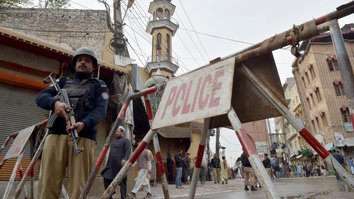ISLAMABAD -- Pakistan is mourning at least 44 deaths in one of the deadliest militant suicide attacks on a rally of an Islamist party in Bajaur district, Khyber Pakhtunkhwa.
A suicide bomber attacked a gathering of Jamiat Ulema-e-Islam (Fazl) (JUI-F), in Bajaur district, which borders Kunar province, Afghanistan, on Sunday (July 30).
More than 150 were injured, officials said.
Bajaur Police spokesperson Muhammad Israr said a state of emergency was declared in the hospitals of Bajaur and adjoining districts, where most of the injured were taken.
![Members of Jamiat Ulema-e-Islam (Fazl) attend a rally in Karachi on July 23. [Zarak Khan/Pakistan Forward]](/cnmi_pf/images/2023/07/31/43257-image0-585_329.jpg)
Members of Jamiat Ulema-e-Islam (Fazl) attend a rally in Karachi on July 23. [Zarak Khan/Pakistan Forward]
The critically injured were transported from Bajaur to hospitals in Peshawar, the provincial capital, by military helicopters, he said.
The "Islamic State of Iraq and Syria's Khorasan branch" (ISIS-K) claimed responsibility for the attack on Monday (July 31) via its news arm Amaq.
ISIS-K has previously targeted JUI-F leaders in Bajaur, as it considers them apostates and has criticised them for participating in electoral politics.
In April 2022, ISIS-K issued a series of fatwas (Islamic rulings) allowing the assassination of JUI-F religious scholars and activists.
"The JUI-F is a peaceful political party that is being punished for taking part in electoral politics and combating the militant groups' misuse of Islam for their subversive activities," said Qari Sabir Mamond, a JUI-F member who had two relatives injured in Sunday's bombing.
Mamond said the attack was an attempt to destabilise his party before the upcoming elections, which are scheduled for November.
Before the 2018 general elections, ISIS-K targeted several political rallies and political figures. In July 2018, more than 140 people were killed at a rally in Mastung district, Balochistan.
In an Urdu tweet on Sunday, Prime Minister Shehbaz Sharif strongly condemned the bombing, stating that "the attack on political parties is a clear indication that the enemy opposes the democratic system in Pakistan. Such actions will not be tolerated".
The US Embassy in Islamabad also condemned the attack in a tweet and reiterated the US government's "commitment to supporting Pakistan's efforts in combating terrorism and ensuring the safety and security of its citizens".
Horrifying scene
"The tent had collapsed on one side, trapping [survivors] who were desperately attempting to escape," said Abdullah Khan, who tried to help the victims.
"There was utter confusion, with human flesh, limbs and body parts scattered throughout the area, alongside lifeless bodies."
Sabeeh Ullah, a 24-year-old party supporter who had his arm fractured by the blast, said the scale of injuries was horrifying.
"I found myself lying next to someone who had lost their limbs. The air was filled with the smell of human flesh," he told AFP by phone.
"It was a suicide attack, with the bomber detonating himself in close proximity to the stage," he told AFP.
AFP quoted Pakistani media as saying there were about 400 attendees in the tent at the time of the explosion, and multiple emergency crews were working the scene.
Crackdown on ISIS-K
The Sunday suicide bombing demonstrates that, while ISIS-K has suffered significant losses during the ongoing crackdown on it, the group is still capable of carrying out lethal operations, mainly aiming at soft targets such as political rallies and non-Muslim minorities in Pakistan.
In June, KP Police's Counter Terrorism Department (CTD) said law enforcement had killed Subhanullah alias Usman, an ISIS-K commander, in Bajaur.
"Subhanullah was wanted in several terror cases, including attacks on security forces and police personnel, and a bounty of 2 million PKR (about $7,000) was placed on his head," Amjad Khan, a senior CTD official, told Pakistan Forward in June.
Also in June, Punjab Police's CTD said it had foiled a major terror plot on Eid ul Adha by arresting nine suspected militants, including a woman, linked with ISIS-K.
The weakened ISIS-K is targeting members of political rallies and vulnerable minority communities out of desperation, officials and analysts say.
ISIS-K claimed responsibility for killing two members of the Sikh minority community in two separate attacks in June in Peshawar.
In April, a Sikh citizen was fatally shot in his shop in Peshawar. Attacks on Sikhs were also reported near Kohat Adda and Sarband last year.
In March 2022, ISIS-K carried out a suicide attack on a Shia mosque in Peshawar that killed more than 64 worshippers.

![Workers move an injured victim to a hospital in Peshawar on July 30 after at least 44 people were killed and dozens more wounded by a suicide bombing at a political gathering of a leading Islamic party in northwest Pakistan. [Abdul Majeed/AFP]](/cnmi_pf/images/2023/07/31/43253-33qb7fa-highres-585_329.jpg)






